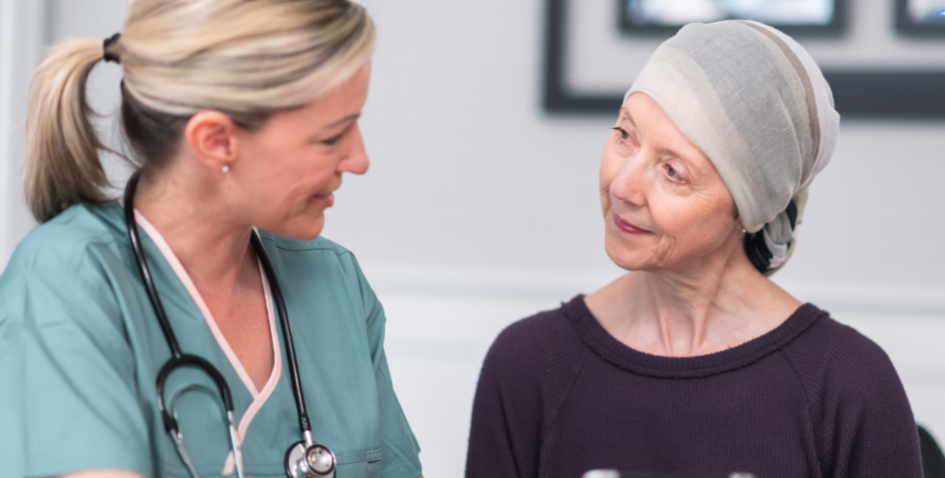While there is no guaranteed method to prevent cancer or cure the disease across its many forms, there have never been more resources available to patients, healthcare providers and communities to fight the disease–often without having to travel far from home.
When it comes to cancer, there are risk factors you have no control over. But according to Catherine Reidy, BSN, cancer nurse navigator at Baylor Scott & White Medical Center – McKinney, there are many steps people can take to reduce their risk.
As a cancer nurse navigator, Reidy serves as a vital educational and support resources for cancer patients and their families. She guides patients and families from day one of the cancer care journey and through survivorship, helping overcome barriers to receiving the care and empowering them in making informed decisions.
“You can’t control age, your race, your genetics or your family history, but there are lifestyle choices we make every day,” she says. “I always tell patients to try to make the choices that keep your risk as low as it possibly can be for you.”
Lifestyle Tips
- Kick the tobacco habit – Quitting smoking and other tobacco products is one of the most
important steps anyone can take to reduce their risk of not only lung cancer, but a wide range of other cancers and diseases. - Watch your weight – Obesity is often associated with the impact it has on heart health. However, obesity has been linked to increased risk of many types of cancer as well.
- Eat lean and green – “I recommend a diet with plenty of fruits and vegetables, especially the green, leafy variety,” Reidy advises. Leafy green vegetables have been linked to reducing the risk of several serious forms of cancer.
- Use a sunscreen – Reduce skin cancer risk by wearing clothing that covers exposed skin or adequate sunscreen if you’re going to be outside.
- Get moving – Exercise is great for your overall health, as well as for decreasing your risk of cancer.
- Watch how much you drink – Alcohol isn’t widely thought of as a cancer risk factor but limiting the amount of alcohol you consume can decrease risk.
An ounce of prevention
Although the treatment options for cancer are more advanced than ever, there is another big reason more patients than ever are surviving a cancer diagnosis.
“We’re able to detect cancers earlier, so we’ve got a higher success rate of curing them,” explains Reidy. “Typically, the earlier we catch it, the less invasive the treatment and the better the treatment outcomes.”
For instance, Baylor Scott & White – McKinney offers 3-D mammography technology, which can potentially detect some breast cancers earlier than other screening technologies. All women should receive an annual screening mammogram after age 40 – sooner if a woman has a family history of the disease.
Skin cancer is another form of the disease that when caught early, is highly treatable. Getting a regular skin check for suspicious moles or other spots from your primary care physician or dermatologist can go a long way in finding this form of cancer whose rates are on the rise.
People with a significant history of smoking who meet certain criteria should consider taking advantage of Baylor Scott & White – McKinney’s lung cancer screening program. This quick imaging procedure uses a low-dose CT scan and can detect lung cancer (the leading cause of cancer deaths) before symptoms even start.
Meanwhile, a colonoscopy can actually prevent colorectal cancer from ever forming. A routine colonoscopy can remove polyps–growths that can turn cancerous–from the lining of the colon.
Peace of mind when scheduling care
We know you may have put your health on hold over the past several months. Whether you have a chronic illness or are due for a wellness screening—like a mammogram or colonoscopy—it’s important you don’t delay. We're here for you. Find out more at BSWHealth.com/SafeCare.
Cancer care close to home
For North Texans, Baylor Scott & White Charles A. Sammons Cancer Center – McKinney offers advanced, personalized cancer treatment options and is nationally accredited by the American College of Surgeons’ Commission on Cancer. This prestigious accreditation recognizes the center for providing patients innovative treatment options, comprehensive care, and robust cancer detection and prevention programs.
Beyond forward-thinking medical treatment–including access to clinical trials–the center has numerous programs essential to navigating the cancer journey and survivorship. Our ReVital Cancer Rehabilitation program helps patients return to normal activities and lessen the impact of cancer and its treatment.
ReVital therapists are trained to meet the complex needs of people living with cancer and survivors. This program can help overall strength, endurance, decrease pain, and improve function and participation in daily life, work and other activities.
We have child-life specialists who support the children of cancer patients and work with adults to help them understand concerns that children have when an important person in their life has cancer or another serious condition. Meanwhile, our supportive and palliative care program focuses on comfort, care and planning for patients and families facing serious illness and end-of-life decisions.
“We’re also focusing on building out our survivorship program, which is really another phase of treatment,” says Reidy. These efforts include many programs designed to keep patients connected to life.
While cancer must be battled on a range of fronts, patients don’t have to look any further than Baylor Scott & White – McKinney to find an ally in the fight.
Physicians provide clinical services as members of the medical staff at one of Baylor Scott & White Health’s subsidiary, community or affiliated medical centers and do not provide clinical services as employees or agents of those medical centers or Baylor Scott & White Health.




